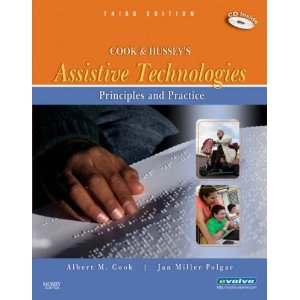6.811: Principles and Practice of Assistive Technology
Course Information
6.811: Principles and Practice of Assistive Technology (PPAT) is an interdisciplinary 12-unit subject centered around a design project in which small teams of students work closely with a person with a disability in the Cambridge area to design a device, piece of equipment, app, or other solution that helps them live more independently. Over the course of the term, each team meets with its "client," iterates through multiple prototypes, and learns about the challenges and realities of designing technologies for people with disabilities.
Last year's projects included an iPhone app for detecting clothing colors and patterns to help a blind person dress independently; a specialized "no-spill" spoon for a person with a spinal cord injury to eat soup more easily; a customized seat cushion for a wheelchair user; a bicycle with sensing and a haptic interface designed for a blind rider; and an Android-based task reminder system for a person with a brain injury causing deficits in working memory.
Along with the project, the course includes guest lectures from clinicians in rehabilitation, human-computer interface experts, product designs, and people living with physical or cognitive impairments, and lab exercises in which students use and evaluate various assistive technologies.
We seek students from a wide range of backgrounds and disciplines. Any experience in design is helpful, but not necessary. Teams of two to three students will complement each other's skill sets.
This course is a good fit for students interested in public service, user-centered product design, working closely with a client with a disability (potentially in consultation with their caregivers and/or clinicians), and tackling difficult, real-world problems. Last fall, it received a 6.6 out of 7 rating overall (Course VI Underground Guide Evaluations.)
We have initiated collaborations with the MIT IS&T Assistive Technology Information Center (ATIC), MIT Public Service Center (PSC), and MIT Edgerton Center. We have also established partnerships with several client groups, including The Boston Home in Dorchester, The Carroll Center for the Blind in Newton, and the The Braintree Rehabilitation Hospital in Braintree and Natick.
The course will be led by co-lecturers, William Li and Grace Teo, with contributions from Prof. Rob Miller (EECS) and a number of guest lecturers and panel members from the community.
For Course 6 (EECS), students can use 6.811 as an AUS requirement or Department Lab. In Course 2 (MechE), 6.811 is a "Suggested Concentration" subject in the CIR track. In Course 16 (Aero/Astro), 6.811 can be used as an PAS elective credit by petition. We also encourage students from BCS, MAS, and everywhere else to join!
Please contact Staff at ppat@csail.mit.edu with any questions.
Textbook (Optional):
Cook and Hussey's Assistive Technologies: Principles and Practice (ISBN-10: 0323039073; ISBN-13: 978-0323039079)Authors: Albert M. Cook and Janice M. Polgar

Purchase from: Amazon or from The MIT Coop
You might also be able to purchase a digital copy of this textbook from the Coop.